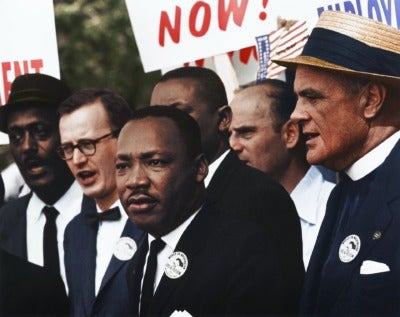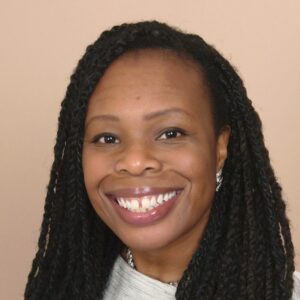Reverend Dr. Martin Luther King Jr., one of the most endeared leaders in our nation’s history, was a fighter for economic equality and civil and human rights. To Dr. King, human dignity, particularly among the poor, was essential to ending poverty. In 1967, he said, “The dignity of the individual will flourish when the decisions concerning his life are in his own hands when he has the means to seek self-improvement.” This work is particularly relevant to mayors and local leaders, whose relentless pursuit of human rights and the worthiness of all people to experience such items as fair pay, safety in all forms, and adequate housing is essential to carrying on Dr. King’s legacy.The unfortunate truth is that today, human rights are under threat, and dignity is forgotten, even as the world celebrates Dr. King on what would have been his 95th birthday. A few short weeks ago, we also paused to mark another important moment, the 75th anniversary of the Universal Declaration of Human Rights (UDHR). Both offer a compass for how we grapple with threats to human rights and create a more promising future.Human dignity is at the declaration’s core, just as it is in Dr. King’s dream of ending poverty. The premise is that basic respect is a birthright every human should experience. As we reflect on the many crises of 2023, what will come in 2024, and the next 75 and 95 years, we must remember dignity. To do this, mayors and local leaders are the ones to watch and model.

Imagine a city where everyone could pursue their ambitions and manage their lives while feeling psychologically, physically, and economically safe? Look to Mt. Vernon, New York where Mayor Patterson-Howard is building a dignity economy — an economy that is sensitive to the needs of families, friends, and loved ones. Within the first two years, she established the first guaranteed income pilot in Westchester County to serve 200 families with $500 a month. The key to this pilot is that residents can decide when and how to use their income so they don’t feel ashamed or degraded. These efforts have uplifted residents and assisted them with food insecurity and housing.
This is also an example of how mayors can use their positions to advocate for basic human rights and the dignity of their citizens. Mayor Patterson-Howard is joined by a network of 125+ municipal leaders who advocate for a guaranteed income to ensure all Americans have an income floor. Mount Vernon’s pilot and others like it affirm the intrinsic dignity and worth of every individual enrolled, regardless of their background, identity, or circumstances — the principle tenant of human rights.
Structural forces such as astronomical housing prices, long-held discrimination, unprecedented migration growth, and unpredictable events such as a pandemic continue to shape the problem of homelessness. Yet, mayors are held accountable and are forced to address the lived reality of housing affordability, access, and adequacy. In 2022, more than 5,000 people were experiencing homelessness in Oakland, California. American mayors, such as Mayor Sheng Thao of Oakland, have taken on the Herculean effort to address the issues of homelessness and housing inequity, all while maintaining human dignity, which is no easy feat. Mayor Thao has set aside a staggering $200 million for creating and acquiring affordable housing units over the next two years. Her approach to ending homelessness is practical but also compassionate. She states, “We must say yes to building safe, dignified, and affordable housing because housing is a human right, and it is our shared responsibility.” For Oakland, embodying dignity means removing harmful and hazardous debris from the streets, opening public spaces for the unhoused to bathe, and coordinating critical care and wrap-around services to those transitioning from undesirable living conditions.
The United Nations estimates that 68% of the world’s population will live in cities by 2050. It only makes sense that local leaders, such as Mayor Patterson-Howard and Thao, are equipped to take action. From the American perspective, three solutions will help mayors advance dignity and human rights at the local level: First, increase direct funding from the federal government, such as those found in the American Rescue Plan, given to mayors and local leaders. This will enable them to implement their innovative solutions. Second, targeted and bold partnerships between philanthropic and local municipal leaders will strengthen the ecosystem of sustainable public services to those most vulnerable populations. American mayors have exemplified what it means to build fruitful coalitions on the global stage. Therefore, more trusted spaces and international engagement toolkits, such as those created by the Truman National Security Project, are needed to share solutions and lessons learned.
Mayors’ and local leaders’ political power and relevance have evolved since the UN Declaration of Human Rights and Dr. King’s death. They are now the torchbearers of human rights and economic and social justice. World leaders stand to gain by observing mayors and embodying Dr. King’s charge to remember human dignity.
Mayor Shawyn Patterson-Howard is the 28th Mayor of the city of Mount Vernon, New York and President of the African American Mayor’s Association (AAMA). Mayor Sheng Thao is the 51st Mayor of the city of Oakland, California and is the first Hmong American mayor of a major city in the United States. Bunmi Akinnusotu is a 2019 Truman National Security Fellow and director of City Innovation at the Aspen Institute. Virgil Parker is a 2020 Aspen Institute William Randolph Hearst Fellow and US Fulbright Alum.


